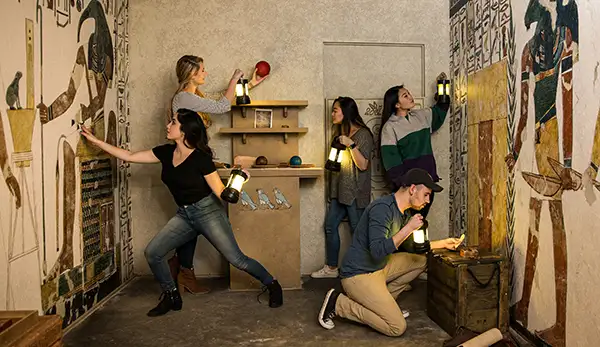Best Escape Room-- Examination Your Skills and Fix the Secret
Wiki Article
Group Strategies: Exactly How to Collaborate Efficiently in an Escape Room
Browsing the complexities of a getaway area requires more than plain excitement; it calls for a well-coordinated strategy grounded in clear communication, tactical duty tasks, and skilled time monitoring. Groups should proactively pay attention to every participant's insights, assign roles that line up with specific strengths, and preserve normal check-ins to make sure focus and prevent redundancy. By fostering an atmosphere that values cohesion and flexibility, teams can substantially heighten their efficiency and success prices. The nuances of these techniques can transform the experience, however how specifically can they be carried out to make the most of the capacity for success?Establish Clear Communication

To promote clear communication, it is necessary to designate a central factor of call for information dissemination. This duty entails summing up findings and suggested techniques to guarantee everybody continues to be on the very same page. In addition, embracing a methodical method to discussions can protect against disorderly exchanges. Short, concentrated updates from each team participant can maintain the team educated without overwhelming them with details - best escape room.

Assign Roles Tactically
While clear interaction establishes the foundation for reliable team effort, designating roles purposefully guarantees that each employee's toughness are used successfully. In an escape area scenario, the time-sensitive and complicated nature of challenges requires a well-organized method to task delegation. By recognizing and leveraging individual proficiencies, teams can enhance their analytic abilities and improve total performance.A person with an eager eye for detail might succeed in locating covert items, while a rational thinker might be better suited to addressing challenges. This role frequently calls for strong business and social abilities.
2nd, make sure that duties are flexible and versatile. As new obstacles emerge, the team should be able to pivot, reallocating tasks as called for. This flexibility aids keep energy and stops traffic jams that could happen because of stiff duty jobs.
Eventually, a calculated method to role task not just makes the most of the staminas of each employee however additionally fosters a natural environment, driving the group in the direction of an effective escape.
Utilize Diverse Skills
Acknowledging and using the varied abilities within your group can substantially elevate your efficiency in a retreat space. Each employee brings unique staminas to the table, and efficiently leveraging these capacities can accelerate analytic and enhance total efficiency. A group member with strong analytical abilities could excel at deciphering complex codes or patterns, while an additional with eager empirical capabilities may quickly detect concealed ideas that others may overlook.
Urge group participants to Read Full Report voice their insights and ideas quickly, making sure that all possible services are thought about. Furthermore, appointing jobs that align with each member's staminas can prevent bottlenecks and ensure that progress is continual.
In addition, variety in skills usually equates to variety in assuming styles, which is vital in an escape room setting. While some obstacles might call for rational thinking and accuracy, others could gain from imaginative and side thinking. By identifying and leveraging this diversity, groups can address a broader series of challenges better, thereby raising their chances of a successful retreat.
Manage Time Efficiently

Determine noticeable problems and separate jobs based on group members' staminas, ensuring that no one is idle. This technique can assist maintain the team focused and stop time from sliding away unnoticed.
Furthermore, stay clear of tunnel vision. If a challenge is taking too long, rotate staff member or relocate on to an additional difficulty, returning later with fresh viewpoints. Interaction is extremely important-- keep everybody upgraded on resolved challenges and staying tasks to stay clear of repetitive initiatives.
Last but not least, use any kind of tips or clues sparingly yet strategically - best escape room. Recognizing when to ask for help can save beneficial time. my blog By adhering to these time administration principles, groups can dramatically boost their opportunities of a successful and enjoyable escape room experience
Debrief and Reflect
Reflection is a necessary facet of group advancement and improvement in the context of getaway spaces. As soon as the difficulty is finished, whether efficiently or otherwise, it is critical for the team to involve in Homepage an organized debriefing session. This process permits staff member to analyze their performance, recognize toughness, and identify locations for renovation.Start the debrief by discussing what went well. Highlight specific instances of effective interaction, problem-solving, and cooperation. Recognizing these favorable habits enhances them and motivates their repetition in future challenges.
Following, deal with the challenges came across. Discuss moments of confusion, miscommunication, or ineffective methods. Encourage an open and constructive dialogue where team members can share their viewpoints without fear of objection. This cultivates a society of continual renovation and understanding.
Conclusion
In conclusion, effective collaboration in a retreat room is based upon clear interaction, critical role projects, the efficient use of varied skills, and efficient time monitoring. Normal check-ins and organized debriefings are essential for keeping emphasis and cultivating constant renovation. By developing a natural and adaptive team setting, the chance of efficiently solving challenges and attaining the purpose of leaving the area is significantly improved. This approach not only makes certain success but additionally advertises collective development and understanding.Report this wiki page